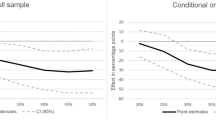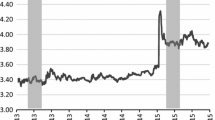Abstract
This paper examines the response of household debt to households’ perception of house prices using data from the first wave of the Household Finance and Consumption Survey. Whereas the literature has hitherto emphasized the effects of housing wealth on consumption, this study concentrates on the effects on debt accumulation—distinguishing mortgage debt from non-mortgage debt and inspecting over-indebtedness. Different measures of housing wealth are considered, controlling for tenure years. The findings reveal that the effects of housing wealth differ by type of loans and with the measure of housing wealth. Over-indebtedness is driven by the same factors that determine mortgage debt, suggesting a strong association between having outstanding liabilities from the primary residence and the risk of entering into default. Further estimations by different income and wealth classes revealed dissimilar housing wealth effects, with non-mortgage debt tending to rise among lower-income households and over-indebtedness tending to be larger among the wealthier.
Similar content being viewed by others
References
Aron J, Duca JV, Muellbauer J, Murata K, Murphy A (2012) Credit, housing collateral, and consumption: evidence from Japan, The U.K., and The U.S. Rev Income Wealth 58:397–423
Arrondel L, Lamarche P, Savignac F (2015) Wealth effects on consumption across the wealth distribution: empirical evidence. Working paper series 1817. European Central Bank
Attanasio OP, Blow L, Hamilton R, Leicester A (2009) Booms and busts: consumption, house prices and expectations. Economica 76:20–50
Burnside C, Eichenbaum M, Rebelo S (2016) Understanding booms and busts in housing markets. J Polit Econ 124:1088–1147
Campbell JY (2006) Household finance. J. Finance 61:1553–1604
Campbell JY, Cocco JF (2007) How do house prices affect consumption? Evidence from micro data. J Monet Econ 54:591–621
Carroll CD (1992) The buffer stock theory of saving: some macroeconomic evidence. Brook Pap Econ Act 23:61–185
Case KE, Quigley JM, Shiller RJ (2005) Comparing wealth effects: the stock market versus the housing market. Adv Macroecon 5:1–32. https://doi.org/10.2202/1534-6013.1235
Christensen I, Corrigan P, Mendicino C, Nishiyama SI (2016) Consumption, housing collateral and the Canadian business cycle. Can J Econ 49:207–236
Cooper D (2013) House price fluctuations: the role of housing wealth as borrowing collateral. Rev Econ Stat 95:1183–1197
Costa S, Farinha L (2012) Households’ indebtedness: a microeconomic analysis based on the results of the households’ financial and consumption survey. Financial Stability Report. May. Banco de Portugal
Deaton A (1991) Savings and liquidity constraints. Econometrica 59:1221–1248
Engelhardt GV (1996) House prices and home owner saving behaviour. Reg Sci Urban Econ 26:313–336
Friedman M (1957) A theory of the consumption function. Princeton University Press, Princeton
Gimeno R, Martínez-Carrascal C (2010) The relationship between house prices and house purchase loans: the Spanish case. J Bank Finance 34:1849–1855
Goodhart C, Hofmann B (2007) House prices and the macroeconomy: implications for banking and price stability. Oxford University Press, Oxford
Guerrieri L, Iacoviello M (2017) Collateral constraints and macroeconomic asymmetries. J Monet Econ 90:28–49
Household Finance and Consumption Network (2013) The Eurosystem Household Finance and Consumption Survey—methodological report for the first wave. European Central Bank. http://www.ecb.europa.eu/pub/pdf/other/ecbsp1en.pdf
Iacoviello M (2005) House prices, borrowing constraints, and monetary policy in the business cycle. Am Econ Rev 95:739–764
Iacoviello M, Neri S (2010) Housing market spillovers: evidence from an estimated DSGE model. Am Econ J: Macroecon 2:125–164
Kim JR, Chung K (2016) The role of house prices in the US business cycle. Empir Econ 51:71–92
Kivedal BK (2014) A DSGE model with housing in the cointegrated VAR framework. Empir Econ 47:853–880
Kuang P (2014) A model of housing and credit cycles with imperfect market knowledge. Eur Econ Rev 70:419–437
Lambertini L, Mendicino C, Punzi MT (2013) Leaning against boom–bust cycles in credit and housing prices. J Econ Dyn Control 37:1500–1522
Lambertini L, Mendicino C, Punzi MT (2017) Expectations-driven cycles in the housing market. Econ Model 60:297–312
Mian A, Sufi A (2014) House price gains and U.S. household spending from 2002 to 2006. NBER working papers 20152. National Bureau of Economic Research
Mian A, Rao K, Sufi A (2013) Household balance sheets, consumption, and the economic slump. Q J Econ 128:1687–1726
Modigliani F, Brumberg RH (1954) Post-Keynesians economics. Rutgers University Press, New Brunswick
Muellbauer J, Murata K (2009) Consumption, land prices and the monetary transmission mechanism in Japan. CEPR discussion papers 7269. CEPR discussion papers
Oikarinen E (2009) Interaction between housing prices and household borrowing: the Finnish case. J Bank Finance 33:747–756
Robstad Ø (2017) House prices, credit and the effect of monetary policy in Norway: evidence from structural VAR models. Empir Econ 542:461–483
Rubio M, Carrasco-Gallego JÁ (2016) Liquidity, interest rates and house prices in the euro area: a DSGE analysis. J Eur Real Estate Res 9:4–25
Shiller RJ (2007) Understanding recent trends in house prices and home ownership NBER working papers 13553. National Bureau of Economic Research
Skinner J (1987) Risky income, life cycle consumption, and precautionary savings. J Monet Econ 22:237–255
Tobin J (1958) Estimation of relationships for limited dependent variables. Econometrica 26:24–36
Acknowledgements
The authors are deeply thankful to the editor and the two anonymous reviewers for their helpful and insightful comments on an earlier version of this article.
Funding
This work was supported by the FCT (Fundação para a Ciência e a Tecnologia, Portugal) under BRU-IUL (Business Research Unit - Instituto Universitário de Lisboa), Grant No. UID/GES/00315/2013.
Author information
Authors and Affiliations
Corresponding author
Rights and permissions
About this article
Cite this article
Camões, F., Vale, S. I feel wealthy: A major determinant of Portuguese households’ indebtedness?. Empir Econ 58, 1953–1978 (2020). https://doi.org/10.1007/s00181-018-1602-9
Received:
Accepted:
Published:
Issue Date:
DOI: https://doi.org/10.1007/s00181-018-1602-9




